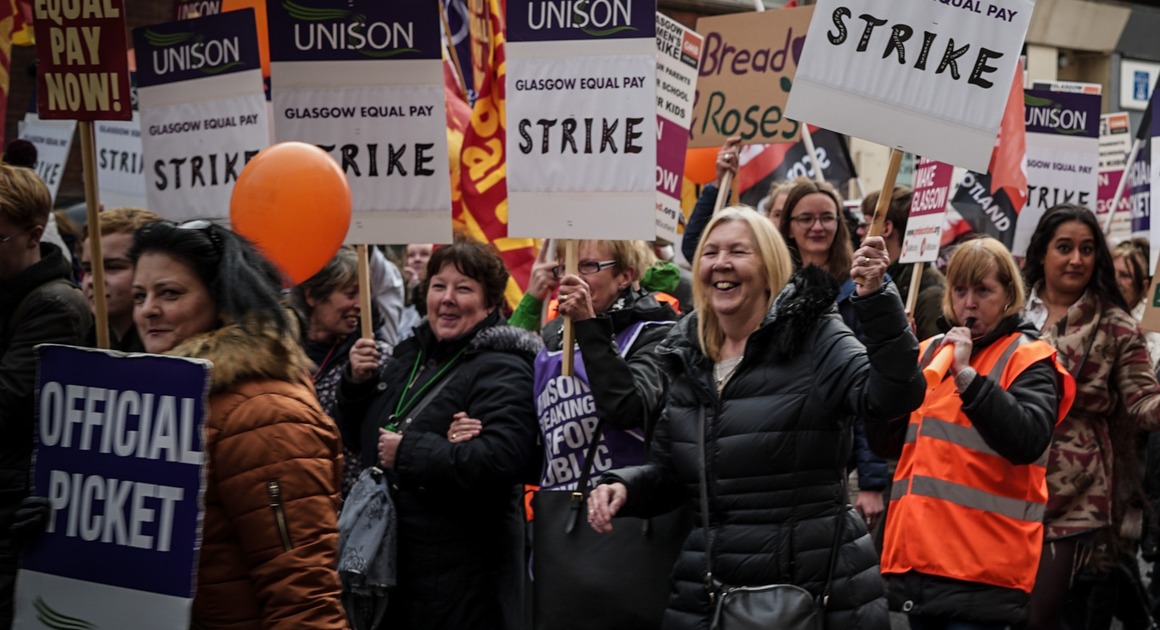18 September - International Equal Pay Day Advancing Pay Justice: Moving Beyond the Halfway Point
 Glasgow Equal Pay Strike. Photo: PSI
Glasgow Equal Pay Strike. Photo: PSIWomen worldwide earn approximately 77 cents for every dollar earned by men for work of equal value, indicating a gender pay gap of 23% - this disparity means that, on average, women effectively work unpaid for about 83 days each year. On International Equal Pay Day, PSI World Women’s Committee assesses advances, identifies limitations, and outlines new goals.

Verónica Montúfar
While the root causes of the gender wage gap have been clearly identified and there have been major visibility and multilateral commitments, such as the creation of the Equal Pay International Coalition (EPIC) in 2019, of which the international trade union movement (including PSI) is a part, the path to pay equity is only halfway travelled.
ILO Convention 100 on Equal Remuneration sets the highest standard by establishing the principle of equal pay for work of equal value, going beyond pay equality for the same job or occupational category. It introduced the crucial dimension of assessing the value of work, recognising that the historical gender-based division of labour has pushed women into different roles and sectors than men, often underpaid or undervalued.
To tackle the problem, two major strategies have been identified:
Eliminating barriers to women's access and advancement in all jobs and sectors.
Revaluing traditionally female-dominated occupations and sectors.
While eliminating barriers has been a more straightforward track, often addressed through legislative measures, revaluing work remains under-addressed, lacking both traction and political will from governments and employers, despite being a key union priority.
"Public service unions are the backbone of the equal pay movement. Our affiliated unions have not just demanded change—they've delivered it through persistent collective action, turning policy promises into real wage gains for millions of women workers around the world." — Daniel Bertossa, PSI General Secretary
A Global Snapshot: Women Workers and Unions Driving Change
Around the world, women workers and unions have been driving crucial changes in pay equity despite varying degrees of legislative progress. From Australia's landmark decision advancing gender pay equity in care sectors to Brazil's transparency requirements, this global snapshot reveals both promising advances and concerning rollbacks in the journey towards equal pay.
Asia Pacific
Australia: Australia's Fair Work Commission (FWC) issued a landmark decision advancing gender pay equity in the health and social care sectors. It found that the longstanding undervaluation of care and early childhood education work was driven by historical gender-based devaluation. The Commission ordered significant wage increases to correct this injustice.
New Zealand: The government's decision to gut pay equity laws and cancel claims was introduced under urgency—without prior signalling during the election campaign and without Parliamentary select committee review. This undemocratic process has made it nearly impossible for new claims to proceed. The 2023 rollback of Fair Pay Agreements erased hard-won progress. But unions continue to resist.
Europe
EU Pay Transparency Directive: The EU took a step forward by introducing new rules to reinforce equal pay through transparency. However, transparency alone does not close pay gaps. The directive demands disclosure but not meaningful action. Employers can delay implementation until 2026 and face weak enforcement.
Arab countries
All Arab countries have laws on equal pay, the challenge for trade unions is to ensure application of these laws.
Yemen: Article 4 of the Yemeni Labour Law prohibits wage discrimination based on gender, race, language, religion, political opinion, or social origin. It guarantees women the same pay as men for the same job under the same conditions, consistent with the constitutional principle of equal opportunity.
Tunisia: Tunisian labour law prohibits wage discrimination based on gender, race, or religion, and enshrines the principle of "equal pay for work of equal value." Under Organic Law No. 58 of 2017, wage discrimination is penalised with fines up to two thousand dinars.
Morocco: Article 346 of Moroccan labour law explicitly bans wage discrimination between genders when the work is of equal value. The law mandates minimum wage compliance and wage payments in local currency, and includes provisions for seniority allowances.
Latin America
Colombia: Law 1496 of 2011 enforces the principle of equal pay for work of equal value. It prohibits discriminatory practices, requires wage audits and record-keeping, and imposes strict penalties on non-compliant employers. The law applies to both public and private sectors, but its implementation through collective agreements in the public sector remains limited due to regulatory constraints.
Ecuador: In 2024, Ecuador passed an Equal Pay Law that, while recognising the importance of revaluing women's work, focuses only on eliminating barriers. It lacks provisions for participation of labour stakeholders through social dialogue or collective bargaining. Public sector unions argue that the absence of wage bargaining mechanisms is the greatest obstacle to closing the gender pay gap. This law appears more rhetorical than transformative.
Brazil: With Law 14,611/2023, Brazil strengthened its constitutional guarantee of "equal pay for equal work" by requiring employers to publish biannual Salary Transparency Reports including anonymised data by gender, race, and age. The law imposes steep penalties (up to 10× the discriminatory salary, doubled for repeat offences), mandates remediation plans involving unions, and requires companies to take action. In early 2025, Brazil released its third Equal Pay Report, established a monitoring committee under the National Plan for Equal Pay, and published a collective bargaining guide for integrating equal pay clauses in union agreements.
Looking Ahead: Unions Demand Bolder Action
To close the gender pay gap and achieve real pay justice, unions around the world call for:
Enforcement of pay equity laws without exception or delay
Elimination of legal, procedural, and institutional loopholes that perpetuate discrimination
Binding roles for trade unions in shaping and overseeing pay equity mechanisms
Implementation of gender-neutral job evaluation systems that accurately value the skills, responsibilities, and social significance of jobs historically performed by women, especially in sectors where women are the majority
Equal pay is a fundamental right. The fight for pay equity is a fight for human dignity, social justice, and the recognition of women's essential contributions to our societies." — PSI World Women's Committee